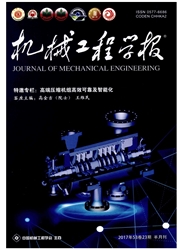

 中文摘要:
中文摘要:
采用分子动力学方法模拟硅探针在空位缺陷和Stone-Wales(SW)缺陷石墨烯上的滑移过程,研究空位缺陷和SW缺陷对石墨烯摩擦力的影响.研究结果表明:两种缺陷石墨烯摩擦力大于完美石墨烯,空位缺陷使石墨烯界面势垒增大导致能量耗散增加,摩擦力增大;SW缺陷使石墨烯表面形成凸起,阻碍探针滑移,摩擦力增大.空位缺陷石墨烯平均摩擦力随缺陷浓度的增加而增加,Y向空位缺陷石墨烯平均摩擦力大于X向,这都是由空位陷处能量势垒和缺陷与探针切向作用距离共同决定的.SW2型缺陷石墨烯摩擦力大于SW1型,X向SW2型缺陷石墨烯摩擦力大于Y向SW2型,因为存在相邻五边形碳原子环结构的石墨烯表面更容易产生凸起,摩擦力较大.以上研究结果完善了缺陷石墨烯的摩擦机制,对设计和开发石墨烯微纳器件提够了理论依据和指导.
 英文摘要:
英文摘要:
Molecular dynamics simulations were performed to investigate the sliding of a Si probe on the graphene with vacancy or Stone-Wales (SW) defects and effects of various defects on friction properties of graphene. Simulation results show that friction on graphene with both kinds of defects were obviously larger than perfect graphene in the defect regions, which was attributed to the increasing energy dissipation resulted from the extended interface barrier potential of graphene due to vacancy. For graphene with SW defects, friction increased because the probe was hindered by the wrinkle which was formed by the dislocation of carbon atoms along Z direction owing to the SW defects. It is also found that friction of graphene with vacancy along Xand Y axis both increased with the increasing defect concentration. The cause of the former result was that tangential interaction range between probe and vacancy along X axis was extended. And the reason of the latter result was that the interface barrier potential between probe and vacancy along Y axis was enlarged as defect concentration increased. In addition, the friction of graphene with vacancy along Y axis was larger than that along X axis, because the interface barrier potential between probe and vacancy along Y axis was larger than the other one while the tangential interaction range difference between probe and two kinds of vacancy defects was negligible. For graphene with SW defects, the friction of type 2 was larger than that of type 1 and the friction of type 2 along X axis was larger than that along Y axis. Reason was that adjacent pentagon carbon rings existed in the former two cases. It is easier for wrinkle formed for graphene with adjacent pentagon carbon rings in the former two cases, which resulted in larger friction through hindering the slide of probe by higher wrinkle. The results of the study improved the friction mechanism of the defects graphene, and provided the theoretical basis and guidance for the design and development of graphene micro-nano d
 同期刊论文项目
同期刊论文项目
 同项目期刊论文
同项目期刊论文
 期刊信息
期刊信息
